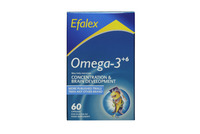A, B, C, D, Omega-3 - Kids give fish a D minus

With ‘back to school’ on the horizon, parents across the country are hoping to give their children the very best start for the new term ahead. But despite widespread health messages regarding the benefits of oily fish, it appears that both kids and parents have not learned to love their fishy friends.
New research undertaken by omega-3 experts, Efalex, shows that although 60% of children know that oily fish can ‘make them brainy’, more than 31% of those surveyed don’t like fish with the main reasons being that they consider it to be too ‘smelly’ (21%) and that it ‘tastes disgusting’ (21%).
The survey of 5,000 consumers (of which 1,035 were children) also revealed that almost 60% of adults do not know how many portions of fish they should be eating a week, with only 30% thought to be eating the correct amount.
Dr Alex Richardson, Senior Research Fellow at the Centre for Evidence Based Intervention, University of Oxford, and co-founder of the UK charity Food and Behaviour Research, says: “This research shows a worrying lack of appetite for oily fish in UK children, which means they are missing out on this rich source of omega-3 essential fatty acids and the many health benefits they provide. Equally worrying is that parents still don’t seem to be aware of how much fish children should be eating on a weekly basis, despite years of government and other advice. Omega-3 are called essential fats because we can’t make them, so they have to come from the diet - and fish and seafood (particularly oily fish like salmon and tuna) are the only reliable sources of DHA unless children take supplements.”
While getting kids to eat more fish can be a challenge, a specially designed supplement such as Efalex can help ensure consumption of essentials nutrients to help maintain healthy brain and eye function. Efalex contains a mixture of DHA, EPA, AA and GLA from fish oil and evening primrose oil. They are the omega-3 and omega-6 fatty acids required for normal brain structure and function.
Dr Alex Richardson continues: “Around 60% of the brain is fat, and the omega-3 DHA should be a substantial part of this. Children need a good supply of this vital nutrient to support their vision, co-ordination, learning ability and concentration, as well as for their general health.”
In addition to looking out for nutrition, World Memory Champion Dominic O’Brien has some quick exercises to help boys and girls perform their best in the classroom (and lend a hand to mums and dads overwhelmed by the ‘back to school’ period) to improve concentration, focus and memory.
Dominic O’Brien’s Quick Tips for School Success!
The Link Method – Memory works by association. Get your child into the habit of making links between information. For example, if they want to remember that Speck means Bacon in German, get them to picture a slice of bacon with a nasty looking speck on it.
Acronyms – Acronyms are a fun way of remembering a series of data and younger children will enjoy creating their own sentences. For example, “My Very Easy Method Just Speeds Up Naming Planets” gives the order of the planets: Mercury Venus, Earth, Mars, Jupiter, Uranus, Neptune and Pluto.
Mental pictures - Turn complicated information into pictures. Take Arctic and Antarctic, if your child is struggling to remember which one is which, get them to think of looking up at an arch and down at an ant – simple!
Remembering numbers – This is a simple method which involves linking a number to a shape. For example, the number 9 looks like a balloon on string, so to remember that Queen Victoria had nine children, picture her carrying a balloon and string.
Spelling – We all have particular spellings that we seem to find a constant struggle to remember correctly. Use imagination to help you remember correct spellings. For example - Accommodate or Accomodate? Imagine Catching a Cat who has just Missed a Mouse to find aCCoMModation
For more information, visit efamol.com

